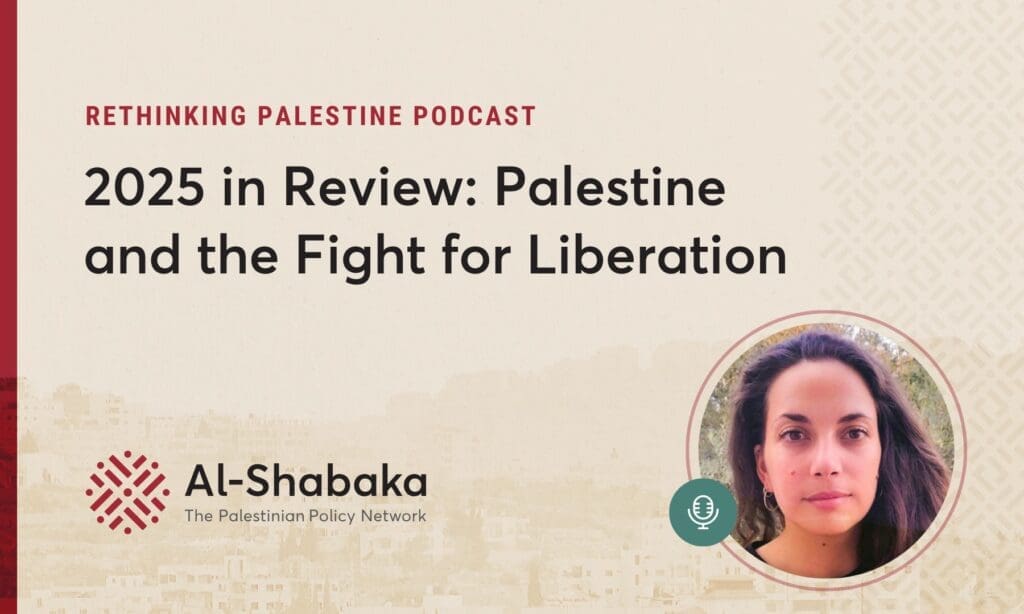About This Episode
Episode Transcript
The transcript below has been lightly edited for brevity and clarity.
Sara Husseini 0:00
Palestine has actually been a singularly unifying issue. We’ve seen that in the hundreds and thousands of people taking to the streets every week, week in, week out, over the past nine months. People from all communities, struggles, walks of life, and that’s been reflected also then in terms of the election of not only the independents, the Greens, but also the really narrowing Labor margins of victory in many constituencies.
Yara Hawari 0:25
From Al Shabaka, the Palestinian Policy Network, I am Yara Hawari, and this is Rethinking Palestine.
On July 4th, the British public elected a new government, as predicted by many pundits and pollsters, the Labour Party led by Keir Starmer won in a crushing defeat for the Conservative Party, which was ousted after 14 years of parliamentary rule. For many supporters of Palestine’s liberation and fundamental rights,
this election posed a challenge with both the major parties supporting the genocidal actions of the Israeli regime. Within the Labour Party, which has traditionally been the political home for many Palestine supporters, this led to some very serious tensions and fractures. Indeed, some candidates were forced to break with the Labour Party and run on independent tickets.
It also gave rise to candidates predominantly running on what was called a pro Gaza platform. Following the election, the first official trip by the new Foreign Secretary David Lamey was to Israel, where he met with Israeli Prime Minister Benjamin Netanyahu. So what does this British post election landscape look like now for Palestinians and their allies?
Joining me to discuss all of this and more is Sara Husseini, Director of the British Palestinian Committee and Policy Member of Al Shabaka. Sara, thank you for joining me on this episode of Rethinking Palestine.
Sara Husseini 1:50
Thank you for having me. I’m really looking forward to it.
Yara Hawari 1:52
Sara, perhaps we can begin by having a little overview of the elections. What happened? What were the significant changes?
Sara Husseini 2:02
As you mentioned in your introduction, what we saw was a landslide majority for the Labour Party. So in this first past-the-post system that we have in the UK, where people vote for their MPs within constituencies, and then the person with the most votes goes to parliament, we saw Labour win 411 seats, which, as you said, is a crushing victory in this system.
But, if you scratch the surface a little bit, what we see is quite a shallow victory. First of all, we’re looking at one of the lowest voter turnouts we’ve had at 60%. And if we bear in mind that the Conservatives pretty much self imploded, they were incredibly unpopular.
In fact, one in five voters actually voted tactically purely to oust the Conservatives. When you see then that Labour have control with 34 percent of the vote share, which is the lowest of a governing party in modern history, it really gives a clearer picture of how there’s very little love for either of the two major parties right now.
What was also really interesting is, and again, as you’ve referred to, is this rise of five independent MPs or the voting in a five independents based on a Palestine platform. So four of those were completely new members of parliament and one of them, Jeremy Corbyn, was elected again, unprecedented in terms of voting in the British system.
We saw the Green Party, which made Palestine an intentional part of its platform, had its best election ever as well. So going from having one seat previously only to four seats. Now we also saw a rise in the popularity of the far right with Nigel Farage’s Reform Party also gaining five seats. So there’s that as well.
But I think in relation to Palestine, We saw what’s happening in Gaza played an important role in this election and more broadly it put a real dent in the machine of party politics and I think showed the real possibility of breaking beyond the two party system for the first time.
Yara Hawari 3:41
Now as I mentioned in the introduction historically the Labour Party has been a political home to many who support Palestinian, liberation fundamental rights, and that was especially the case under the leadership of Jeremy Corbyn but the purge of so-called Corbynistas and in general leftists from the party has meant that that’s no longer the case.
Not to mention since the beginning of the genocide, Starmer and other key figures have been supportive of the Israeli regime’s actions in Gaza. So what is the Labour Party like now for people who support Palestinian liberation?
Sara Husseini 4:22
First of all, I think it’s important to build a bit, really, in terms of Starmer and others being supportive of the genocide, because we don’t say this lightly.
I think it’s important to kind of add some examples there of what we mean when we say that. And I think no Palestinian in the UK and I’m sure many other people are going to forget that interview that he gave in October on LBC when he said that Israel had a right to cut off power and water to the people of Gaza, which is collective punishment and a war crime under international law.
And then we saw four months later, Starmer’s Labour leadership effectively upended parliamentary protocol to push for a Labour amendment on a ceasefire vote, there was a motion that was brought by the SMP that removed the term collective punishment from the motion, among other things, specifically to shield Israel from accountability.
And this support for Israel goes beyond that as well, in the sense that people will remember the LBC interview very well, but maybe fewer people will know about the speech he gave to Labour Friends of Israel, it’s an annual lunch in 2021, where he recalled the colonist language of the Zionists, the early Zionists, making the desert bloom and associated racist tropes along those lines.
So yeah, this is the Labor leadership that we have in power now. To your point about the purge, I think even just before the elections, we’ve seen a series of deselections before the elections even took place of left leaning candidates. Faisal Shaheen, for example, was one of them that was famously reported.
Reported attempts to bar Diane Abbott from running as a Labor candidate. And at the same time, backing new candidates like Luke Gakehurst, for example, who is the former director of an organization called We Believe in Israel, which is a very active supporter of genocide. So in short, it’s a really difficult environment for those Labour MPs, councillors, and party members who rightly stand against the genocide, who believe in the universal principles of justice,and who understand that there can be no justification for the massacre of now more than 40, 000 people. And as we’ve seen recently, a very conservative estimate by the British medical journal, The Lancet, that could be somewhere around 186,000 people, not to mention, you know, the collective punishment and the starvation of 2 million.
So it’s these people at all levels of the party weighing up resignations. We saw a number of councillors, Labour councillors resigning over this issue in the past months. And, weighing up whether to stay in the party and push back from within, try to bring the party back to its values, or whether to step out.
Yara Hawari 6:41
So despite this hostile environment within the Labour Party, I think what’s been really interesting in this election and also elections elsewhere across the world is that Palestine broadly, but also the ongoing genocide in Gaza has been a key issue. And I think it’s something that’s almost unprecedented in terms of foreign policy concerns amidst election.
So what does this tell us about Palestine as a core issue for people?
Sara Husseini 7:16
YeahI think that’s exactly right. And what you’re pointing to there is something that has happened in despite a really difficult environment. There’s a dynamic that we’ve been seeing playing out through the elections and beyond.
Attempts, particularly by the previous government, elephants, the mainstream media to stir up real divisions in the UK to kind of frame or try and make Palestine a sectarian issue, a Muslim issue, a matter of Muslim Jewish communal tensions and sort of stoke these kind of cultural wars. When actually what we’ve seen, as you’ve said, is we know in reality and what we’ve seen has been quite the opposite.
Palestine has actually been a singularly unifying issue. We’ve seen that in the hundreds and thousands of people taking to the streets every week, week in, week out over the past nine months. And people from all communities, struggles, walks of life, and that’s been also reflected then as we’re speaking now in the election, in terms of the election and not only the independents, the greens, but also the narrowing Labor margins of victory in many, very many constituencies that have gone less reported, but very important to take notes of.
People understand that Palestine is not a singular issue. It’s an issue of our collective humanity, it’s an issue that unites people and brings people together because they see the injustice and recognize that.
Yara Hawari 8:36
And perhaps also because people are increasingly becoming aware of the complicity of their own governments and what their type of contributions are going toward.
The fact that the British government is directly complicit in the ongoing genocide, I think plays a huge role in politicization of really hundreds of thousands of people.
Sara Husseini 8:59
Absolutely, and I think also you just see people being much more alive to the issue now. I think many more people are questioning what they’re seeing on the mainstream media, and they’re seeing how it doesn’t tally up with the images, and live streamed genocide they’re seeing through social media, for example, or on their phones.
It’s really making people who potentially, like you say, this is a foreign policy issue for many people in the UK, but they’re seeing it now and they’re seeing the reality of it, and it becomes their issue as well. And as you said, I think not underestimating how foreign policy issues don’t normally affect elections, this one clearly has.
Yara Hawari 9:35
If you’re enjoying this podcast, please visit our website al-shabaka.org where you will find more Palestinian policy analysis and where you can join our mailing list and donate to support our work.
And that kind of explained the rise of these independent candidates who are predominantly running on what people are calling pro Palestine or pro Gaza platforms.
Can you tell us a bit more about these individuals?
Sara Husseini 10:01
As we mentioned, this is five independents elected, unprecedented, the election of independents to Parliament in this number. Four of them, as we said, new candidates ran on a Palestine platform from all over the country. So we have candidates from the North in Blackburn, from the Midlands in Birmingham and Leicester, in Dewsbury, it’s also in the North of England, and then obviously Jeremy Corbyn in Islington North in London.
I think as well as them and running as human beings of conscience on a Palestine platform and obviously being voted into parliament because people felt they were speaking for them, there are a number of others who are very, very close to unseating the major parties. I think perhaps the most significant one being the 23 year old British Palestinian Leanne Mohamed who ran in her home constituency of Ilford North, which is here in London, against Labour’s now Health Secretary, West Streeting.
And this is the man who had widely been tipped to be the next leader of the Labour Party. She was 528 votes shy of beating him. They both had around 15,000. I think that sends a really strong message about how people feel about not only what’s happening in Gaza and Palestine more broadly, but how deeply complicit the establishment here in the UK is.
Yara Hawari 11:17
So I think it’s not by coincidence that the Labour Party has now placed several vocally pro Israel MPs in Campanile, including David Lammy, who I mentioned earlier as Minister for Foreign, Commonwealth, and Development Affairs.
What can we expect moving forward in terms of British foreign policy vis a vis Palestine? Because it seems like there won’t be much of a difference with the previous government’s policy.
Sara Husseini 11:42
The early signs are not looking good. Although I guess we did expect that from, as you say, those who have been placed in the cabinet. And there’s a number of issues that we were looking straight away to see how the government would respond or deal with those.
One of those I think, the amicus brief, the objection lodged by the previous government’s international criminal court against arrest warrants for Netanyahu and Gallant. There are a couple of other issues. I mean, arms trade, for example. So I think Lamy and the Labour leadership had called on the previous Conservative government to publish legal advice from lawyers around Israel breaking international humanitarian law, which would then result in the need to suspend arms sales to Israel.
We haven’t seen anything really of movement on that yet, either in terms of calling to publish legal advice or, as you know, the government should be doing, suspending arms sales immediately pending any kind of review they want to make. So, yeah, it’s still a little bit difficult to see how these things are going to go.
I think obviously the U. S. election is going to play a role, of course, coming up in November. So I think we have a Labour leadership that is not massively indistinguishable from the previous government, honestly. And there’s going to be a lot of work to do. I think the difference is that Labour does hold certain professed principles, has made a number of statements prior to becoming in government that I think we need to really hold them accountable to.
And I think that’s where the work’s going to be, it’s going to be with those MPs in the Labour Party. Labour Party members, unions, those who really do hold to Labour’s professed principles and the universal values. And then looking cross party, I think also, you know, we’ve looked with Independents, Greens, other parties, to who may hold different political views, but do have moral clarity on the deep injustices that are being faced by Palestinians and that we’ll be able to hopefully hold a Labour leadership who claims to support international law, to support the independence of mechanisms of justice, to actually hold them to account on that.
Yara Hawari 13:41
Do you foresee any potential for for cross party coalitions on this particular issue? Particularly as we’re seeing, as you mentioned, the sort of these fractures or or disruptions in the two party system and the rise of independent candidates and sort of other spaces within parliament to deviate from party lines.
Sara Husseini 14:00
I do. I’m hopeful and I think because there are a few, we just touched on a couple of the issues, but there are a few issues where I think it’s really clear that Labour, at least in word, hold to certain principles, have made comments about things that need to be done. You know, they base a lot of what they talk about on respect for international law and the rule of law and international mechanisms for justice.
And so I think there’ll be a lot of people in not only their party but other parties who believe in these things, who will be, I hope, willing to scrutinize, to be there and be putting in questions, putting in early day motions, putting in all kinds of things that will really, as I say, hold, hold Starmer and his leadership to account.
Yara Hawari 14:43
Sara, you mentioned the Labour Party’s values that some people still hold dear to, we know that Palestine isn’t an issue that exists in a vacuum and Labor’s current position on Palestine really speaks to the transformation of Labor as a whole. So it’s moved to the center in an effort to challenge the right.
Do you think it’s still possible for it to return to those so called values that you mentioned? Or are we seeing a complete transformation of the Labour Party where return is not possible?
Sara Husseini 15:22
I don’t know. It’s a really hard question.
Yara Hawari 15:25
I guess the reason I’m asking that is because It’s not just Palestine, is it?
You know, the Labour Party has abandoned a lot of its core base. It’s abandoned the working classes, it’s abandoned its values and its politics that it was supposedly established on, and its argument for doing so sort of to challenge the far right, be a more inclusive party. Which is in reality a shift towards the center.
And we’re not just seeing that in the UK. We’re seeing that across Europe where sort of left wing parties are becoming more centrist to gain more votes. So the issue of Palestine really speaks to a broader political problem where we’re seeing the solution of the left and leftist values. So with that in mind, do you still think that there is a chance for the Labour Party to recover from this?
Sara Husseini 16:30
I think it’s a very, very big job if possible, but like you say, I think if you look to other issues to their policies and some of the rhetoric around immigration that we saw Starmer using on to try and win votes from the center, and questions of privatization, there’s a number of things that, as you say, they’ve moved to the center, ostensibly, like you said, to counter the right.
But actually, all you see is a rightward shift then, because we’re not really talking much about the reform situation but one of the big stories around reform was that Suella Braverman, the former Home Secretary, was considering potentially defecting. There was all this talk about her potentially defecting to reform.
She was a Tory Home Secretary who was the architect or at least the big champion of this sending people to Rwanda on planes, asylum seekers scheme. She was calling to criminalize the Palestinian flag. So across a number of issues and she was the Home Secretary. Now that her moving even further right shows that the Labour Party abandoning its principles and moving further to the center is just actually playing into this rightward shift and these, as I say, some of this stuff in terms of culture wars isn’t just about Palestine.
It’s about stoking up division among communities in the UK. And you know, one really worrying report we’ve seen in the last week or so, is Starmer and the Labour leadership creating something called the Muslim Leadership Council. So a new Muslim body that can give credible policy recommendations to the government.
It’s effectively bypassing the existing community structures for the Muslim community. It’s a very dividing rule tactic. And it’s just really, really worrying that there’s an electorate obviously was not happy with you across, and not just the Muslim community, many communities, but rather than deal with that and amend policy and think about why that might be that you’ve lost that support, you would bypass them to create a whole new structure.
So again, I think that’s just a slightly different example, but it, it speaks to what I think you’re asking, right? Which is, is the Labour Party salvageable? I think. I mean, not under this leadership, certainly. And it’s a huge, huge job. But I think that’s where this so dissatisfied, so unhappy is the British electorate with these two parties that it, for the first time, we have seen this glimmer of light, this cracking slightly of the two-party system.
And I think that should really, you know, give hope for a different way of doing things.
Yara Hawari 18:48
Sara, I have a final question. In the immediate term, what should we watch out for in terms of British foreign policy vis a vis the ongoing genocide in Gaza.
Sara Husseini 18:59
I think ICC arrest warrants and what happens there, we’ve mentioned also the arms trade and what they do in terms of making good on their claim to want to publish the legal advice and then act upon it.
I think it’s going to be interesting also to see how they respond to rulings at the International Court of Justice, whether it’s the case that South Africa brought against Israel for genocide, or the ruling we saw around the occupation and the unlawful nature of the occupation. Because this is the other thing, this goes beyond Palestine in the sense that what happens here, Palestine is really a litmus test for the whole international system.
And what the new government here and everywhere and others do has the potential to collapse that whole international system that we’ve seen to date. And I think even the foreign policy chief said very clearly after the ICJ ruled on this, gave an interim ruling on the South Africa case, that governments are going to have to make a choice.
They choose either to support international institutions and the rule of law, or they choose to support Israel. And that was a guy who’s not been particularly helpful on Palestine. That’s a very clear, very honest statement.
Yara Hawari 20:05
So given all of this, Sara, how do we not despair?
Sara Husseini 20:11
That’s a good question. I think while the picture isn’t particularly positive in the short term, I think it does feel like a moment of inflection in the longer run. And that’s really difficult to say in the midst of genocide and not to mention all of the settler colonialism, of occupation, annexation, apartheid, exile, the things that have been used to subjugate and oppress the Palestinian people as a whole for more than three-quarters of a century.
But I do think there are some glimmers of hope when we look at what’s happened here in the UK and I’m sure in some other places as well. We said before people are definitely more alive to the reality of what’s happening and are questioning their own government and their own leaders on these things.
We talked about the translation of the streets week in, week out, people protesting, people just getting out on the streets from many different communities. We see more and more people making ethical choices about where they spend their money. We’ve seen it translated in the student encampments, this generation of students willing to risk their safety, their futures, because they see it as being nothing compared to how their fellow human beings are suffering in Palestine, and they see it a much bigger issue broadly for our humanity.
And as we’ve been discussing today, again, this has been translated at the ballot box and yes, it’s a landslide majority and lots and lots of seats for Labor, but we shouldn’t underestimate the significance of what this has done in terms of a two-party system and having some new hope through Independents and Greens.
And it’s about the hope it really creates for the future in terms of showing people that it actually is possible to vote a different way. It’s really important. So I think no one really knows exactly when that tipping point will be when you’re in the middle of this, I don’t think. But I think all we have to do is just keep going and doing everything in our power to get there and not only show us as Palestinians in Palestine but really for the sake of our collective humanity.
Yara Hawari 21:57
Sara, thank you so much. We’ll leave it there. But it was great to have you on Rethinking Palestine.
Sara Husseini 22:03
Thank you for having me.
Yara Hawari 22:07
Rethinking Palestine is brought to you via Al Shabaka, the Palestinian Policy Network. Al Shabaka is the only global independent Palestinian think tank whose mission is to produce critical policy analysis and collectively imagine a new policymaking paradigm for Palestine and Palestinians worldwide. For more information or to donate to support our work visit al-shabaka.org and importantly don’t forget to subscribe to Rethinking Palestine wherever you listen to podcasts.













